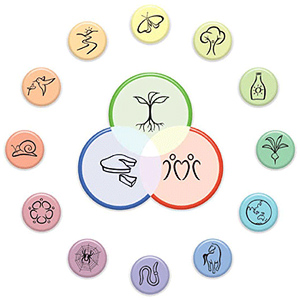What is permaculture? Permaculture is a philosophy of design and integration providing sustainable solutions for meeting essential human needs. Here's a more detailed, classic definition:
| "Permaculture (Permanent Agriculture) is the conscious design and maintenance of cultivated ecosystems which have the diversity, stability and resilience of natural ecosystems. It is the harmonious integration of landscape, people and appropriate technologies, providing food, shelter, energy and other needs in a sustainable way. Permaculture is a philosophy and an approach to land use which works with natural rhythms and patterns, weaving together the elements of microclimate, annual and perennial plants, animals, water and soil management, and human needs into intricately connected and productive communities." [From a course taught by Bill Mollison and Scott Pittman] |
 The design principles of permaculture [source]
The design principles of permaculture [source](click image to learn more)
Permaculture is wonderfully adaptable to place and to whatever challenges may be presented. At Asanté Gardens, we will apply permaculture principles in the context of a subsistence farm feeding a community of residents who are all living and working together. Though we will not be challenged by lack of water, poor growing conditions, or harsh climate, we will nonetheless be inspired to create intelligent designs for our food gardens and dwellings which address things like: overgrowth of vegetation, excess water, mold and rot, dampness, spoilage, and invasive plants and animals (for example, wild pigs).
The core principles of permaculture – Earth care, people care, and fair share – are very much in line with our community vision.
With the proper design and integration of systems, and by making use of resources both on the land and obtained locally, we intend to:
- produce abundant food
- create low-cost, attractive structures and dwellings
- create a honeybee sanctuary
- grow and harvest herbs, spices, and medicinal plants
- collect and store ample water
- harvest wood for building and fuel
- use solar PV to generate sufficient electric power
- recycle all organic waste into compost, mulch, and fertilizer
- reduce land-fill waste to zero
- produce surplus goods to offer for sale or trade